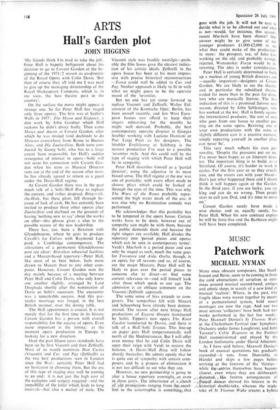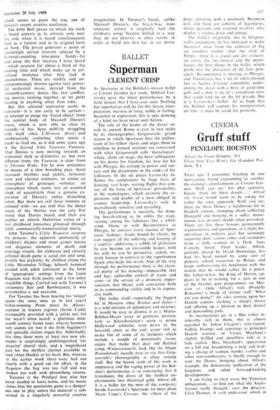MUSIC Patchwork
MICHAEL NYMAN
Many once obscure composers, like Stock- hausen and Berio, seem to be coming in from the cold abstractions of serialism to rum- mage around musical second-hand, antique and ethnic shops in search of a new kind of musical 'realism'. Where, in the past, tiny fragile ideas were woven together by means of a permutational system, bold sound montages are now the rage. And our two most serious 'collectors' have both had new works performed in the last few weeks: Peter Maxwell Davies's St Thomas Wake at the Cheltenham Festival (Bac Symphony Orchestra under James Loughran), and John Tavener's Celtic Requiem at the Festival Hall (commissioned and played by the London Sinfonietta under David Atherton).
As I have said before, Maxwell Davies's book of musical quotations has gradually expanded—it runs from Dunstable to Handel and skips a few pages before arriving iat the foxtrots of the 'thirties— while theeantries themselves have become clearer, ,even" where they are deliberately
.1),AiltpAted( foxtrot arrangements of 5.1htigell -dances showed his interest in the _rti historical double-take, whereas the triple- •• take of St Thomas Wake creates a hybrid which seems to point the way out of Davies's recent creative confusion.
The John Bull pavan on which the work is based appears in its entirety only near the end, when it is heard simultaneously both as a foxtrot and in its original form on harp. The pavan generates a series of
charmingly period foxtrots (played by a
battered-sounding nine-piece band)—far and away the best foxtrots 1 have heard —which account for about a third of the running time and which make up in cal- culated insolence what they lack in smoochiness. These are starkly and un- compromisingly thrown against very power- ful orchestral music, derived from the sixteenth-century dance, like two conflict- ing movies running together, at no point meeting in anything other than time.
But this schizoid separation seems to represent—it is too early to be certain— an attempt to purge the 'heard object' from the central body of Maxwell Davies's music, which is now able to close its wounds—it has been publicly struggling with itself since L'Homme Arme—and unobtrusively assimilate what music it needs to feed on, as it did some years ago in the Second John Taverner Fantasia. That Davies is now moving towards an orchestral style as distinctive as, but very different from, the Fantasia, is clear from St Thomas Wake. For he now articulates by means of a slow brooding pace, sharp incessant rhythms and pedals, ferocious horn and clarinet ostinatos, to create an atmosphere of grotesque violence: an atmosphere which seems less an assumed cloak of eccentricity than a genuine ex- pression of Davies's rather disturbing talent. But there are still those foxtrots to contend with—we are told that the dance music of the 'thirties was the very first music that Davies heard, and their use implies an almost Mahlerian vision of a lost childhood innocence glimpsed through adult commercially-manufactured music. John Tavener's Celtic Requiem reverses the process: the apparent spontaneity of children's rhymes and street games retains and disguises elements of death and marriage rituals. An elaborate and cleverly collated death game is acted out and sung, prettily but joylessly, by children (from the Little Missenden Village School) hemmed around with adult sentiment in the form of 'appropriate' settings from the Latin Requiem text, Irish poetry and a few other inaudible things. Carried out with Tavener's customary flair and flamboyance, it was nevertheless a sad occasion.
For Tavener has been hearing his 'voices' again—the same ones as in last year's ballot-winning Prom piece In Alium: soprano in trapeze register (Jessie Cash), presumably provided with a safety net, for she wasn't often heard; a glutinous nine- teenth century hymn tune; wheezy harmon- ium sounds (or was it the Irish bagpipes?) and sporadic vicious organ fire. Admittedly, this time there were at least two new ele- ments—a surprisingly undistinguished 'ex- pressive' choral style, and a magnificent part for the shrillest clarinet available to man (Alan Hacker at his best). But, whereas in the earlier work these were laid out clearly with a good ear for effect, in the Requiem the bag was too full and was shaken too well, with diminishing returns.
Tavener is the Prodigal Son who has never needed to leave home, and- his music shows that the quotations game is a danger- ous one to play unless the material is sub- mitted to a singularly powerful creative imagination. In Tavener's hands, unlike Maxwell Davies's, the bric-a-brac loses whatever stature it originally had—the children's songs become defiled in a way they do not deserve; in other words, in order to build one first has to cut down.



































 Previous page
Previous page